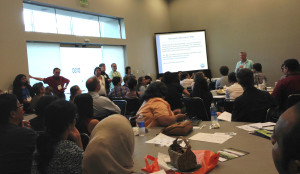Last but not least, as a very active member of the iConnect team, I went to the workshop regarding the funding opportunities available from three of the most important federal agencies in the United States: USDA (United States Department of Agriculture), DOE (Department of Energy) and NSF (National Science Foundation). It was very popular, as I could not find a place to sit at all. Well over 70 people attended! I am including a picture inside the room taken in a hurry, as the questions and answers were all so interesting I did not want to get distracted!
As a Mexican early career faculty, currently sending proposals to different federal agencies in my country, I know how it feels to be in the ballgame. As my colleagues and collaborators in the U.S. have told me before, it was important to update my information on the state of funding in the United States, to know how I can help them, if it is the case. When I was a postdoc at Texas A & M University, economic crisis hit hard on our University system. It was difficult to see new and seasoned professors suffer a good deal of stress due to the lack of funding. Unfortunately the economy has improved but the amount of money destined to research has not increased. It is a bit depressing due to the great effort we invest preparing our proposals. It was the general feeling of many of the attendees to this workshop, I believe.
After listening the alarming numbers regarding population growth without control, I was wondering if a positive effect could be the increasing number of people dedicated to science. This is good news, right? But, what about lab space and funds? Well, I am an optimist and, as with many of my colleagues, a fighter. I think that these federal agencies are trying to help us but they have to support the best of the best, therefore the only thing we have to do is prepare our proposals until we reach excellence and keep trying until we get funded or drop dead!
The workshop was very complete as USDA‐NIFA, USDA‐ARS, DOE and NSF program staff discussed current research and education opportunities available in their agencies for Plant Biologists. Please visit each agency website to find which program fits better your interests and needs.
In addition, the speakers gave us useful advice on how to navigate the process. One key clue is to contact directly the program director and ask as many questions as might be needed. The process is very transparent as it is peer reviewed. However, the proposal to be successful has to pass several reviewing filters and be at the very top of the proposals to be recommended for funding. Nowadays we all are doing outstanding science and preparing our proposals as excellent as we can. As I said before, to be successful we will have to be the best of the best.
Below is the list of the staff members of each agency who presented a very complete view of the programs that they currently support.
Liang‐Shiou Lin, Shing Kwok and Pushpa Kathir, NIFA
Sharlene Weatherwax and Gail Mclean, DOE
Karen Cone and Diane Okumura, NSF
It was a useful workshop, but there were too many people interested that the time was not enough. I hope this kind of workshop continues during Plant Biology meetings as many more people will be looking for a place to obtain this kind of information.
Thanks to the organizers and the agencies staff members who were helping us with our questions and concerns.


While I agree that any funded proposal needs to be the best of the best, in other words, be a great idea, I feel like they’re almost picking those proposals at random now (yes, there are a lot that probably don’t make the cut, but those that are left all get top marks and can easily not be funded; I worry that that phenomenon is getting worse, not better). I don’t know what the solution is, but certainly there’s more great science proposed than being funded. Of course continuing to work hard to make a proposal excellent is important to do, but if you consistently get excellent reviews and no funding, it’s a recipe for feeling like merit doesn’t pay off and that’s tragic.